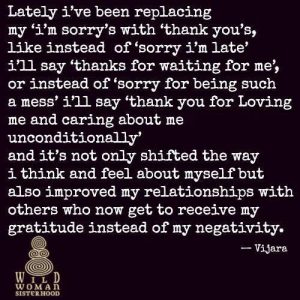Sorry, Not sorry.

Sorry pattern
How often do we say we’re sorry for things we’ve done that don’t require a sorry response? Has guilt become an automatic state of feeling for us?
We often say “Sorry” automatically without even thinking about it. “I’m sorry you’re sick.” “I’m sorry you didn’t get the job.”
Neither of these things can be controlled by us, yet we often hear or give a ‘sorry pattern’ response.
Here’s another list of Sorry Statements I’ve heard lately:
“Sorry I’m wearing jeans and a t-shirt. Should I wear something more dressy?”
“Sorry, I’m just a moody mess today.”
“Sorry to bother you.”
How often do you hear the word sorry as a response to an everyday, somewhat inconsequential thing? And are you able to change anything by being sorry for these types of circumstances?
If you realize that you’re just saying an automatic sorry, think about what it does to your self-care. It makes you feel like you did something wrong. Like you’re less than able in some way. Like you are guilty of something. It can make you feel discouraged and sad. Likewise, it doesn’t do a lot for the receiver either. They might just hear a bit of an automated response. And you probably feel like that’s what you’re delivering.
‘I’m sorry you didn’t get the job’ probably doesn’t make them feel as good as, “I know what an incredible employee you are – if there’s something I can do to make you feel better today, what would that be?” That’s an action you can take – being sorry is a passive response that doesn’t really help either of you.
So before saying you’re sorry, ask yourself these questions:
- Have I really done anything to feel sorry about? (If yes, go to whether you can rectify it, and if so, how.)
- Am I responsible for this? Why might I feel responsible for this?
- Is this a “sorry pattern” response in my life? (If yes, what do I need to do in order to break this pattern?”
- Do I really want to keep feeling guilty about this? How can I let this go once and for all?
- How can I turn a an automatic sorry into an empowering statement or an offer of support or assistance?
What if your “I’m sorry” began with “Thank you.”

As the creator of this Meme and the idea expressed here suggests, shifting the content of the response can shift the way you feel about yourself and puts the receiver in a space of recognizing your gratitude. Or, as in the above example your support.
To me, this is a self-care win-win.
So, if I normally say, “Sorry for being such a moody mess today,” I could say “Thanks so much for standing in this uncomfortable space with me today. I appreciate your unconditional support, especially when I am having an off day.”
“Sorry to bother you” could become, “Thank you so much for supporting me! You’re always so helpful when I need an answer or solution and I have something I’d like to run by you.”
“Sorry I’m wearing jeans and a t-shirt. Should I wear something more dressy?” might sound like, “You know, I was feeling pretty casual today, but if you think I should dress up a bit more, I would appreciate your honesty before we get to the event. I know I can count on you to be totally honest with me.”
“Sorry you’re sick” could turn in to “It sounds like you’re in need of something comforting or healing. Is there anything I can do for you? (but only offer something if you’re willing. Sometimes I think we use the word “sorry” as a way of being supportive, but we have no time or intention of doing anything. Only offer support if you can follow through – remember Day 4 – let’s not overcommit! It could also be expressed as, “It looks like you are really feeling lousy. Take good care of yourself!” Most of the time, people just want to be heard and acknowledged.
If you’re feeling like the word sorry is playing a bigger role in your life than it could be, try editing it out and replacing it with gratitude or support. As we’ve already learned, gratitude can change your life and it can transform the lives of those around you when they see you practicing extreme gratitude in every way.
